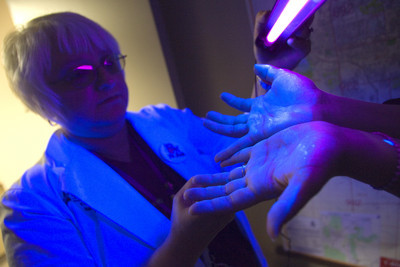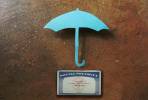Hospitals already taking care
Spring Valley Hospital Medical Center is encouraging patients to ask health care providers if they have washed their hands.
Sunrise Hospital and Medical Center purchased more expensive padding for patients with bladder problems.
And at University Medical Center, a rapid response team of bedside nurses is available 24-7 to answer immediate medical problems.
Whether it be new technology, a new hospital policy or a campaign to encourage patients to get involved in their own treatment, Las Vegas hospital officials say they've been working on improving patient safety for years and don't plan on losing dollars as a result of Medicare's no-pay list.
"Patient safety isn't a new issue just because government has new plans,'' said Ann Savin, a registered nurse and director of quality management and performance for the Valley Health System.
"We've known about pay-for-performance for a while now.''
Starting Oct. 1, the Centers for Medicare and Medicaid Services, or CMS, will stop reimbursing hospitals for care related to giving patients the wrong blood type, leaving objects in patients after surgery, pressure ulcers, hospital-acquired injuries and other preventable problems.
That means if a Medicare patient at Sunrise Hospital gets a bladder infection after they've had a catheter, the hospital won't receive payment for treating that infection.
"The headline caught my attention,'' Savin said. "Our commitment to patient safety is unchanged.''
The Valley Health System comprises Valley, Spring Valley, Summerlin, Centennial Hills and Desert Springs hospitals.
The federal government believes the no-pay list will save the agency about $190 million over five years.
Medicare's do-not-pay list seems like a drastic approach to preventing medical errors, especially considering that insurance reimbursements to health care providers are criticized as low; but some health care providers say it's probably the best way to hold accountable those who don't practice stellar medicine.
"CMS is tired of paying for people who are really bad. I don't want to pay for people getting bad health care over and over again,'' said Minta Albietz, chief nursing officer at Sunrise Hospital.
Like a number of hospitals in Las Vegas, Sunrise has implemented new policies for staff and purchased technology to help reduce medical errors.
The hospital recently stopped using a certain bed pad for patients who suffer from urinary incontinence in favor of one that is less irritating to the skin and is more comfortable, Albietz said.
The new pad, which is more expensive than the old one, is higher quality and has a softer surface with an absorbent gel, Albietz said.
At Spring Valley Hospital in southwest Las Vegas, health officials are paying attention to hand washing through a device known as the "glitter bug.'' The device uses a black light that illuminates areas of the hands, shown in purple blotches, that contain bacteria.
As part of the hospital's hand-washing campaign, patients are encouraged to ask their attending physicians and nurses if they have washed their hands, said Janice Austin, a registered nurse and director of regulatory compliance at Spring Valley.
The campaign includes staff wearing buttons with the words "It's OK to Ask" on them. Pamphlets are also placed in exam rooms.
"Hospitals can have some really sick people in them, and there are people coming in from outside,'' Austin said. "There's always the potential for cross- contamination. Really, the first step for preventing infections is to keep your hands clean.''
The focus on clean hands is to keep pneumonia rates among ventilator patients at zero.
Next year, Medicare will add three more errors to the no-pay list. Ventilator-caused pneumonia is a candidate; so is drug-resistant staph infections.
Savin said hand washing is key to preventing hospital-spread infections, but hospitals also need help from patients and their families to prevent medical errors.
For example, she said, patients who are too ill to walk should follow their medical care provider's instructions to avoid falling.
Treatment for Medicare patients who fall while being treated in a hospital is one of the eight errors for which Medicare won't be paying.
"Falls are a very complex patient safety issue. We always assess everyone for the risk of falls,'' said Savin, who serves on a statewide committee that focuses on patient safety.
"In most situations, we have to adjust their care based on those risks. We warn them not to do certain things, especially when they are in an unfamiliar environment. But there are always people who are resistant to warnings.''
She said patients need to communicate with health care providers, especially about their medical history and what medications they are taking.
"We are going to do our part. We need the patient to do their part as well,'' Savin said.
Contact reporter Annette Wells at awells @reviewjournal.com or (702) 383-0283.
MEDICARE NO-PAY LIST On Oct. 1, Medicare will stop paying hospitals for the care they must provide to treat eight preventable injuries: • Urinary tract infections from catheters. • Bloodstream infections from using catheters. • Falls. • Bed sores, or pressure ulcers. • Objects left in a patient during surgery. • Blood incompatibility, giving a dangerously wrong blood type. • An infection after heart surgery called mediastinitis. • Air embolism, an air bubble in a blood vessel. Hospitals and private insurers are coming up with their own no-pay lists, mixing and matching from the Medicare list and a list of more rare errors such as operating on the wrong limb. THE ASSOCIATED PRESS




























